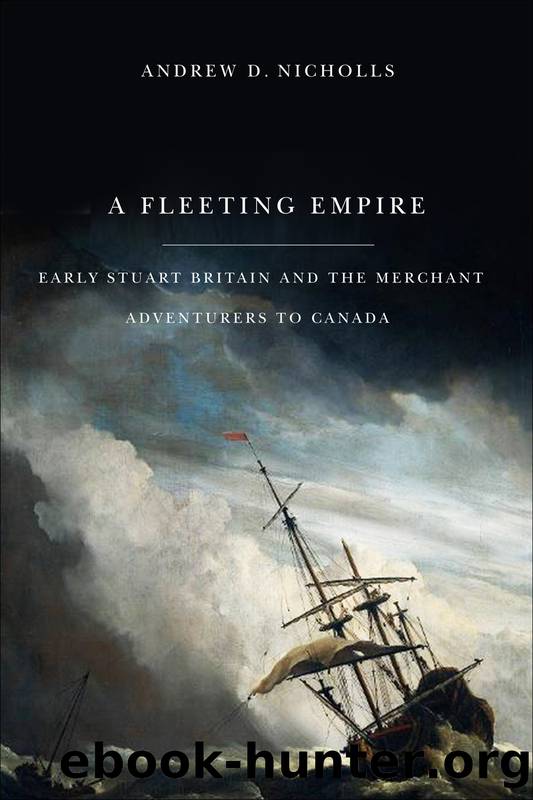Fleeting Empire by Andrew Nicholls

Author:Andrew Nicholls [Nicholls, A]
Language: eng
Format: epub
Publisher: McGill-Queen's University Press
Published: 2010-03-15T00:00:00+00:00
We can now return to the plans that had been unfolding in London for operations in North America in the spring and summer of 1629, and fit Lord Ochiltree into that story. The reader will recall that during the early winter of 1629 the elder Sir William Alexander had agreed to unite his endeavours in planting Nova Scotia with the Kirke-Newburgh syndicateâs aspirations to control the St Lawrence, in a new incarnation of the Merchant Adventurers to Canada. We have also mentioned that this partnership represented more than a simple harmonization of commercial interests. If successful, these two initiatives would see agents loyal to the king of France swept from Canada and Acadia. In the process, another blow could be delivered against the French as part of the ongoing war; British interests in Newfoundland, New England, and Virginia would be buttressed; and defensive resources could be shared. Such coordination was wholly in keeping with home defence measures that the British governments had employed in the current war since 1625 and indeed with security needs for British installations in North America that had been speculated upon in writings dating back to the first Elizabethan interests in Newfoundland.32 Now, the convergence of wartime priorities, in combination with the right personnel, created the potential for a new and coherent British strategy across the Atlantic.
The decision reached sometime in the spring of 1629 to place a colonial installation on Cape Breton Island under the command of James Stewart of Killeith, fourth lord Ochiltree, has its place within this wider context. As we have discussed, overall plans for the year called for the Kirkes to renew their assault on Quebec, while the young Sir William Alexander proceeded to finally plant his colony at Port Royal in Acadia.33 Ochiltree journeyed to London sometime during the winter of 1628â29, and even though his name had never appeared in any document connected with Nova Scotia, or any other overseas venture, prior to this point, he obtained a grant of £500 from the king for the purpose of planting a new colony on Cape Breton Island.34 While no correspondence survives to indicate the origins of Ochiltreeâs interest in overseas ventures, the timing of the financial grant, along with the composition of his party, suggests several possibilities.
It may be that Charlesâs grant to Ochiltree was a reward for his efforts on the kingâs behalf in relation to the Revocation scheme in 1625â26. Or, as Ochiltreeâs debts at home and his failure as an advocate for the kingâs controversial Revocation program cannot have given him many opportunities for success in his native kingdom, he may have viewed emigration as a chance for a fresh start. It is also possible that Charles saw the grant as a way of ridding himself of an underling who was no longer useful as an advisor and may have been a lightning rod for dissent, but who could be of service in establishing firm colonies. Finally, it has been suggested that Alexander solicited Ochiltreeâs assistance because he was experienced with colonial ventures, dating from his efforts in Ulster.
Download
This site does not store any files on its server. We only index and link to content provided by other sites. Please contact the content providers to delete copyright contents if any and email us, we'll remove relevant links or contents immediately.
The Vikings: Conquering England, France, and Ireland by Wernick Robert(77303)
Ali Pasha, Lion of Ioannina by Eugenia Russell & Eugenia Russell(39320)
The Vikings: Discoverers of a New World by Wernick Robert(36483)
Cecilia; Or, Memoirs of an Heiress — Volume 1 by Fanny Burney(31333)
Cecilia; Or, Memoirs of an Heiress — Volume 3 by Fanny Burney(30934)
Cecilia; Or, Memoirs of an Heiress — Volume 2 by Fanny Burney(30889)
The Conquerors (The Winning of America Series Book 3) by Eckert Allan W(27746)
Empire of the Sikhs by Patwant Singh(22173)
Hans Sturm: A Soldier's Odyssey on the Eastern Front by Gordon Williamson(16634)
The Secret History by Donna Tartt(16627)
Cat's cradle by Kurt Vonnegut(13868)
Sapiens: A Brief History of Humankind by Yuval Noah Harari(13054)
Pimp by Iceberg Slim(12932)
Leonardo da Vinci by Walter Isaacson(11903)
Norse Mythology by Gaiman Neil(11883)
Talking to Strangers by Malcolm Gladwell(11879)
Underground: A Human History of the Worlds Beneath Our Feet by Will Hunt(11258)
4 3 2 1: A Novel by Paul Auster(11052)
The Radium Girls by Kate Moore(10907)
